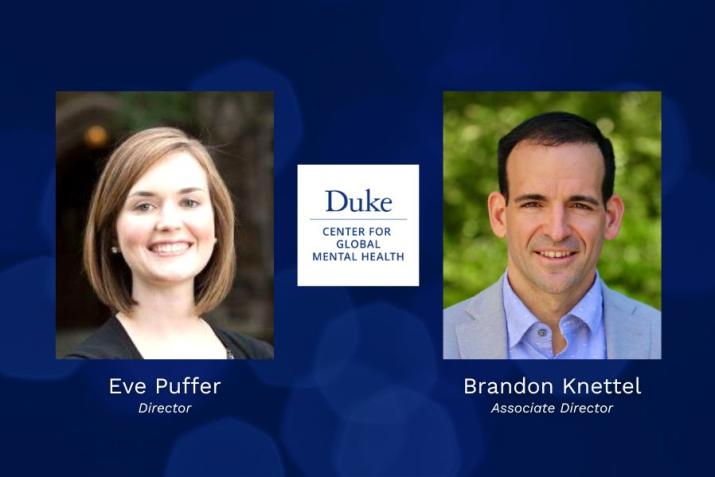
Duke Center for Global Mental Health officially launched this month at DGHI.
Published February 2, 2024, last updated on February 6, 2024 under Around DGHI
The newest research center within the Duke Global Health Institute isn’t really new at all. But the formal establishment of the Duke Center for Global Mental Health is expected to focus even greater attention on an area of critical research need.
The World Health Organization reported a 13 percent increase in mental health disorders in the last decade. Around 20 percent of the world’s children and adolescents have a mental health condition, according to the WHO. But many low- and middle-income countries have too few trained mental health providers to keep up with rising demands. Tanzania, for example, has just 55 psychologists and psychiatrists in a nation with more than 60 million people
The new center will focus on understanding and addressing those disparities in access to care, says center director Eve Puffer, Ph.D. This isn’t the start of global mental health work at Duke instead, it’s a renewed effort to connect Duke-affiliated professionals practicing in the field through a unique, interdisciplinary approach.
“We need creative solutions to reach much larger numbers of people with what we already know works in mental health treatment,” says Puffer, the Pamela and Jack Egan Associate Professor of Psychology and Neuroscience and Global Health. “That’s one of our priorities.”
The scope of mental health also has changed, moving past a sole focus on diagnostic labels. Stressors such as poverty, HIV, intimate partner violence and trauma contribute to distress. The center will seek to prevent or lessen the burden of those challenges, especially in marginalized populations with limited care options.
“As nations improve their health, they’re realizing they can only go so far without addressing mental health because it has such a profound effect on other health issues,” says Brandon Knettel, Ph.D., a licensed psychologist and an assistant professor of nursing and global health who will serve as the center’s associate director. “We’re doing away with this model of, ‘If you meet these criteria, you need treatment. If you don’t, you’re well.’ Mental wellness is on a spectrum, and it doesn’t fall into neat categories.”
Funded through an endowment from The Bill & Melinda Gates Foundation, the center’s partners span Duke with more than 35 faculty from the School of Medicine, School of Nursing, the Trinity College of Arts & Sciences and other schools across campus. They include nurses, neuropsychologists, epidemiologists, policy experts, philosophers and researchers from a range of fields.
The center will create a hub for a range of ongoing projects, including interventions for children and families, substance use prevention and treatment, suicide prevention, epilepsy care and support for sexual and gender minority individuals in low-resource settings. Its faculty are collaborating with partners in countries such as Guatemala, Vietnam, Kenya, India and Uganda.
“In addition to treatment, we want to shine a light on the importance of prevention of mental disorders and the promotion of well-being,” Puffer says. “This prevents suffering and reduces the unmet demand for mental healthcare.”
“The center launch creates a home for faculty, research staff and students from across the University to share their passion [for this field].. that will improve the wellbeing of people around the globe,” says Kate Whetten, Ph.D., director of the Center for Health Policy & Inequalities Research, a partner with the new center.
In addition to faculty, the center has more than 20 undergraduate and graduate student trainees. Maeve Salm, the center’s clinical research coordinator, believes the student involvement reflects the concern of younger generations about the importance of mental health and health equity.
“We can help center and leverage young peoples’ voices to revolutionize what mental health can look like,” says Salm, a 2023 graduate of DGHI’s Master of Science in Global Health program. “Mental health is an important topic we all encounter on a regular basis – it’s a fundamental aspect of wellness.”
Kathleen Sikkema, Ph.D., the founding director of DGHI’s former global mental health initiative, says she was “delighted” to hear of the center’s establishment. Sikkema, chair of the department of sociomedical sciences at Columbia University, sees the center as an example of how global mental health continues to thrive.
“Although we have learned much about the problem and there is less stigma in many places around mental disorders, many challenges remain,” says Sikkema, noting how some populations are without mental health specialists. “DGHI has a great opportunity to explore these and other important issues.”
The Duke Center for Global Mental Health is currently seeking a faculty member and a post-doctoral associate in global mental health to join its team. Interested applicants should contact Maeve Salm at maeve.salm@duke.edu. If you’re interested in contacting the CGMH, please reach out to dukegmh@duke.edu.


